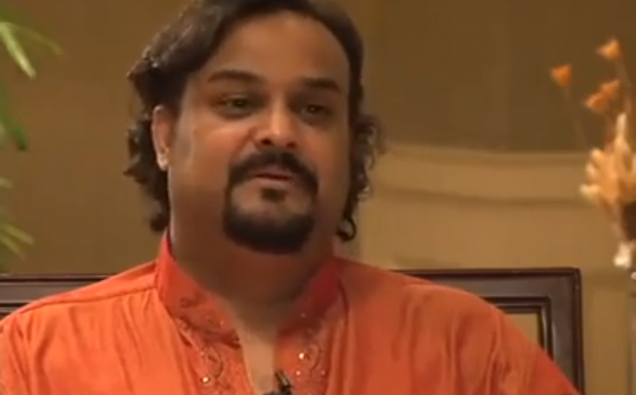
It was only last month that Amjad Sabri enthralled Pakistani-Americans in Washington metro area with his devotional Sufi music, resonating a message of spiritual connection and love for humanity.
On Wednesday, the news of his targeted killing in Karachi came as a shock, evoking anger at his killers and sorrow for the bereaved family, as indeed for millions of his followers on the national loss.
“We lost a great artist,” Mumtaz Hussain, a New York-based artist and author wrote on his Facebook page.
“Just like many of you, I too was shocked to hear about the tragic death of the legendary star Amjad Sabri,”Dr. Tariq Shahab said in a social media post.
“One cannot hold tears– not only at his untimely death, but also at the sad plight of our country —- peace loving, smiling faces are silenced without any reason or remorse?”
“Speechless,” wrote Yousuf Chaudhry, who had organized the Amjad Sabri’s performance at Springfield’s Waterford hall in May.
Sabri’s targeted murder came as a tragic reminder that Pakistan still has a lot to do to defeat forces of parochialism and extremism that target voices of moderation and peaceful coexistence. A Taliban faction has reportedly claimed responsibility for the murder.
Amjad was the son of legendary Qawwali singer Ghulam Farid Sabri, who along with his brother Maqbool Ahmed Sabri formed an outstanding band that popularized the genre of Qawwali throughout Pakistan and the South Asian region. Later, Nusrat Fateh Ali Khan with his innovation and experimentation lifted the Qawwali to unprecedented international fame and acclaim.
On Wednesday as news broke out of Sabri’s murder, Pakistanis around the world took to the social media to condemn the killing, posting pictures with the Qawwal, who was keeping alive the South Asian tradition invented by famous poet and musician Amir Khursro in the 13th century.
The very act of devotion to and praise of the Creator, and seeking a spiritual link through Prophet Muhammad (Peace Be Upon Him) in Qawwali resonates the message of love for God’s creation, humanity, transcending boundaries of race, color, tribe or nationality.
“My message is love, to the farthest corner it can reach,” Amjad Sabri once said during an interview.
In Sabri’s death, Pakistan has lost a vital Sufi voice that echoed as a powerful narrative and a force to counter extremism and violence. The loss is unfortunately the latest among countless killings Pakistan has lived through in the last 15 years. It again raises the question how long will it take for the country to get rid of the menace of extremist thinking and terrorist violence.
The proposition facing Pakistan is clear : While operations against militants in tribal areas and criminal elements in Karachi have been partly effective, the country needs a sustained effort to defeat forces of radicalization and parochialism – one that must involve a comprehensive campaign to combat militant mindset through peace narrative, educational reforms and economic opportunity.
Now the least the government, the state and the society can do is to look inwardly and find answers to collective failure to stamp out the menace of extremism.
This introspection must lead the nation to find ways that protect exponents of peace, music and arts as indeed politicians and religious voices that preach moderation and tolerance as antidote to radical thinking that leads to murder of innocent citizens.
It is also now up to all peace-loving people to carry on the mission of love, peace and spiritual bonding with contributions in areas of their expertise or opportunity – something that is so crucial to canceling out the poison of extremism that is shaking the roots of the society.















Really sorry for that great loss
Mumtaz